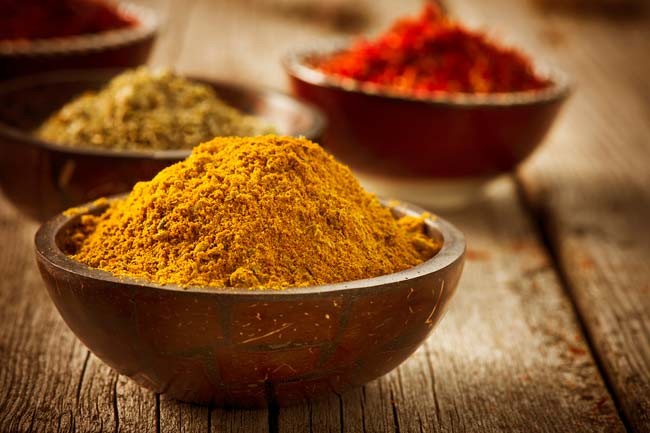- Make It Yourself Lavender Heart-Shaped Bath Bombs!
- 20 Things You Never Knew About “Down There”
- 12 Best Foods For Those Suffering From Arthritis Pain
- 12 Personal Hygiene Mistakes Almost Everyone Makes (Mom Never Told You About #4!)
- 15 Medicinal Plants And Herbs From The Cherokee People
- 12 Mind-Blowing Benefits Of Drinking Coconut Water During Pregnancy
- 12 Outstanding Winter Foods That Won’t Fatten You Up Like A Christmas Turkey
Turmeric: The Most Powerful Medicinal Plant on the Planet

Photo credit: bigstock.com
8. Potent Anti-Inflammatory
As we mentioned above, oxidative stress and chronic inflammation are thought to be behind most, if not all, chronic diseases and aging in the body. Acute inflammation (a temporary state) can be very important when it comes to helping the body recognize foreign invaders and damage that has happened so the immune system will respond to make repairs.
However, chronic, or on-going, inflammation plays a part in almost every disease you can think of; heart disease, Alzheimer’s disease, heart disease, arthritis, metabolic syndrome, and heart disease. Therefore, anything that will fight chronic inflammation is a good thing. The curcumin in turmeric is highly anti-inflammatory. In fact, it is so powerful that it actually matches the effectiveness of some prescription and over the counter anti-inflammatory drugs. Curcumin blocks a molecule that turns on genes related to inflammation.
9. Protection from Various Types of Cancer
Research submitted in 2012 showed that curcumin was a potent arresting agent of esophageal cancer. Although current research did not show that curcumin actually stopped the cancer from forming, it did show that it greatly slowed down its progress and development through a mediated Notch signaling pathway.
In addition to cancer of the esophagus, research has also shown that this powerful little root can play a protective role when it comes to fighting prostate cancer. A study done in 2012 showed that curcumin arrests the metastasis of prostate cancer cells in vivo by stopping the expression of CXCL1 and CXL2 cytokines. This same type of inhibitory process also resulted in the diminished capacity of the metastasis of breast cancer cells.
SEE ALSO: 31 Ways Turmeric Protects Against Chemicals
10. Improved Brain Function
One of the most interesting things about curcumin is that it can get past the blood/brain barrier and work in the brain. Very few other substances in this world, including most pharmaceutical drugs, are able to do this. Your brain has a fascinating process by which it can form new connections and even multiply and increase its number of functioning neurons. One of the main drivers of this process is called Brain Derived Neurotrophic Factor, or BDNF. This is a type of growth hormone that functions within the brain itself. Many common brain disorders, including depression and dementia, have been linked to decreased levels of this important hormone. The curcumin in turmeric can increase the levels of BDNF in the brain, delaying or even reversing many age related and other types of brain disease or dysfunction of the brain. Increasing this vital hormone can also improve memory and cognitive function, making you smarter.
This is just a small list of the health benefits that we know about from this amazing spice. In Ayurvedic medicine, curcumin has been used for the following:
- Liver diseases
- Cystic fibrosis
- Inflammation
- Hemorrhoids
- Atherosclerosis
Although turmeric has been shown to have side effects only in those who appear to be allergic to it, if you are consuming any prescription drugs, if you are pregnant, or if you are under a doctor’s care for any type of health condition, be safe and consult your physician before consuming turmeric or curcumin supplements.
References:

































Ellis Drewery
Aug 3, 2015 at 1:05 pm
I have been taking turmeric for a couple of years now….and I don’t see all the wonderful benefits attributed to this herb. I have had a multitude of inflammatory issues with my ankle, hip and hands. I take celery seed extract, garlic, ginger, tart cherry extract, and turmeric, and still see very little signs that they do very much good. I do not have Rheumatoid Arthritis, just the maladies of aging in my joints. In comparing the day to day maintenance use of herbals against the benefit that can be derived from just one prescription tablet for inflammation, it is easy to see how detractors might disparage the use of natural remedies.
ce373
Aug 10, 2015 at 4:04 pm
Have you tried Glucosamine Condroitin with MGM? I have been on it since I was 52 and now am 71.5 and Praise the Lord not one ache or pain in my body by taking usually only one pill a day.
Ellis Drewery
Sep 9, 2015 at 4:15 am
Thanks for the suggestion, ce373. Glucosamine and Chondroitin have been included in almost every joint formula in existence for a long time now. MSM is relatively new but, I have taken it also in the past. I am now taking a supplement with collagen, boswellia, white willow bark, ginger, and a host of others. I intend to give it a three month trial before passing judgement.
ce373
Sep 10, 2015 at 2:11 pm
Some experienced people say that if it isn’t working after a year, but some change has been experienced, one probably isn’t taking the right dosage.
Glen
Aug 3, 2015 at 2:54 pm
i take a half a teaspoon with my powdered fiber supplement every day. i`ve seen this article 3 or 4 times now and it never tells us how much of the actual spice is needed to gain the benefits. so the article is really no help. but i guess when you get paid by the word…..